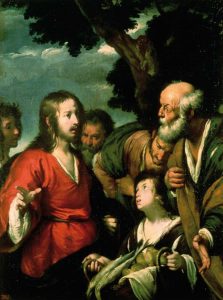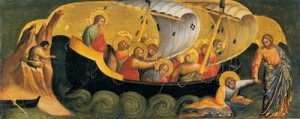Thoughts on Sunday’s Lessons for Aug. 2, 2020
First Reading (Track One): Genesis 32:22-31
We catch up with Jacob one more time in the continuing series of Track One first readings that we’ve been following for several weeks.

The Miracle of the Five Loaves and Two Fishes (early 1600s); painting by Bernardo Strozzi (1581-1644). Private collection. (Click image to enlarge.)
Again the trickster confronts a force that proves stronger than he is, and yet, he wins. Or does he? Jacob, who saw God in a dream of angels going up and down a heavenly ladder at Bethel, now meets God’s angel in another dream. He struggles mightily against this mysterious foe, and earns a new name, Israel – “who struggles with God.” Jacob, now Israel, comes of age in the understanding that God is not just somewhere out there in a distant universe but can be found right here with us in our daily lives, where we ask hard questions and even struggle with God.
First Reading (Track Two): Isaiah 55:10-13
In Sunday’s Track Two first reading we hear some of the final verses written by the second of the three ancient prophets whose work bible scholars believe is consolidated in this memorable book of prophecy. The overall narrative of Isaiah tells of the chosen people’s loss of Jerusalem and the Temple, their exile to Babylon, and their eventual return home to Jerusalem, where they build a restored temple. In these verses, having assured the people that God has forgiven their failures of justice, Isaiah in these verses paints a beautiful image of God as the giver of life and sustenance and all that is good.
Psalm (Track One): Psalm 17: 1-7, 16
God remains faithful to the people of Israel, even when they struggle, even when they fail; so the Psalmist celebrates God’s faithful, steadfast love. This special kind of love is so sure and certain that there’s a specific Hebrew word for it, “chesed,” a word rich with connotations of faith, loyalty, care and grace. The Psalmist reminds us that God loves us and will protect us when we seek refuge.
Psalm (Track Two): Psalm 145:11-18
The Psalms incorporate a wide variety of genres: hope, lament, petition and praise, a diverse anthology that seems appropriate for all the ways that God’s people approach the divine in worship and song. The last group of Psalms, though, conclude the book with songs and shouts of praise..The two segments chosen for Sunday’s Track Two reading celebrate the graciousness and compassion of God, who satisfies every living creature’s needs and stands near to all who call.
Second Reading: Romans 9:1-5
Having emphasized in last week’s reading that nothing can separate us all from God’s love through Jesus, Paul now looks back to God’s faithfulness to the descendants of Abraham, Isaac and Jacob-become-Israel. Paul, like all Israel, inherits God’s covenant and commandments “through the flesh” of family heritage. But, in this letter calling on Rome’s Gentile and Jewish Christians to love and accept one another, he reminds us that we, too, become children of God through the Spirit.
Gospel: Matthew 14:13-21
The story of Jesus feeding the multitude is so beloved that it’s repeated in varying forms in all four Gospels: The multiplying loaves and fishes. How did Jesus do that? The notion that many dug into their own supplies to supplement the feast rings true to anyone who’s ever indulged in a church potluck. So does the simple symbolism of God’s faithful abundance … and of Jesus taking bread and feeding the community. But look closely at these words: “They need not go away; you give them something to eat.” Can we hear an echo of Jesus saying, “I was hungry and you gave me food … just as you do it to one of the least of these, you do it to me”?

